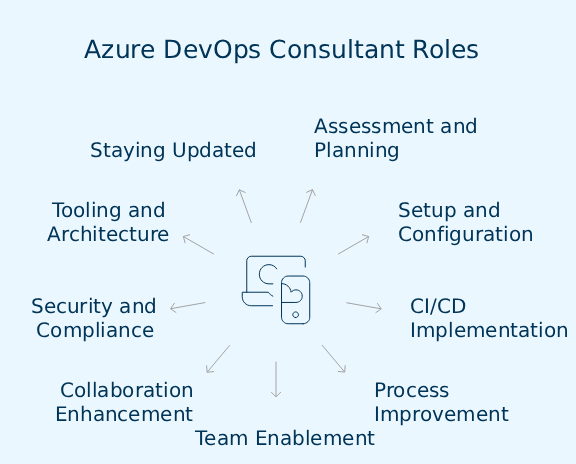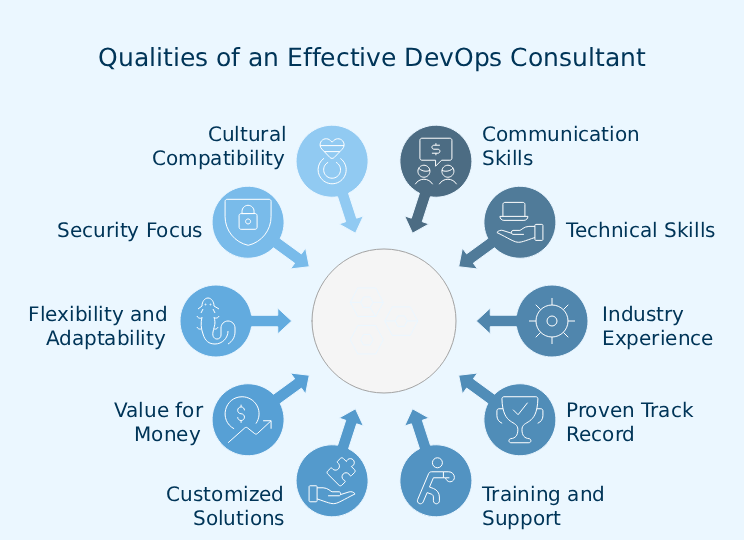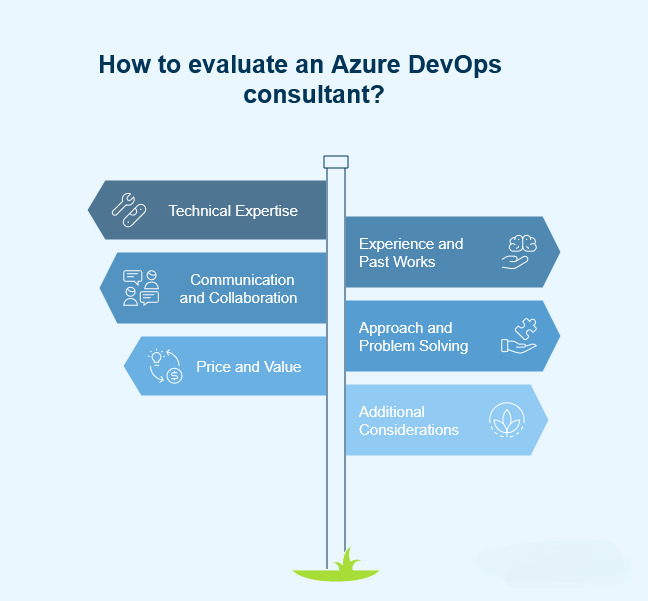Top Qualities to Look for in the Best Azure DevOps Consultants

Choosing the right Azure DevOps consultant can be the key difference-maker when software projects run smoothly or end up in misfortune.
These experts aid companies in better establishing the modern tools and approaches of Microsoft Azure for building, testing, and delivering applications. However, not all consultants are alike.
Azure DevOps Consulting Services offer a blend of technical proficiency, practical, real-world implementation experience, and a track record of successful DevOps engagements.
In simple terms, consultants know how to collaborate across teams and interact with stakeholders. Being an ever-increasingly changeable world, the top consultants maintain a steady learning curve with the latest trends and tools.
This blog will discuss the top qualities you should put under your checklist when choosing an Azure DevOps Consultant. Whether you are just adopting DevOps or are working on advancing your setup, these tips will guide you in selecting the right partner.
What is an Azure DevOps Consultant?
An Azure DevOps Consultant provides support to companies, at best using Microsoft’s Azure DevOps tools, so that software development and delivery may be accelerated and are better organized. These are their roles:

1. Assessment and Strategic Planning
To begin, Azure DevOps consultants examine your current environment and actual workflows related to development. They identify discrepancies and inefficiencies and note how to improve the system to meet their needs. Finally, they composed a specific roadmap to ensure your team can embrace Azure DevOps efficiently.
2. Azure DevOps Setup and Configuration
Consultants take care of all initial configuration steps such as project creation, selecting and integrating proper tooling, and setting up automated pipelines for building, testing, and releasing software.
3. CI/CD Pipeline Implementation
They build and implement Azure DevOps pipelines to automate the phases of software development, ensuring faster and more reliable deployments.
4. Process Improvement and Workflow Optimization
Such Azure service providers aim to eliminate roadblocks, accelerate delivery, and maintain rigorous quality standards by automating processes and instilling Agile practices into your development workflow.
5. Team Enablement and Support
The consultant’s team enables the members by training them to utilize Azure DevOps tools efficiently and sustains its support to assist them by resolving occurrences, guaranteeing success forever.
6. Improving Collaboration and Communication
Together, they work to enhance communications with development and operation teams by providing clear workflows and promoting a culture of collaboration.
7. Security and Compliance Governance
Azure DevOps Consultants help initiate security best practices, governance, and policy enforcement to ensure compliance with industry regulations is attained.
8. Tooling and Scalable Architecture Design
Based on business needs, they provide guidance on the best tool selection and integration within the Azure DevOps environment and the design of a scalable and efficient architecture.
9. Getting Up to Date with Advancements
Since Azure DevOps is constantly changing, consultants stay updated with cutting-edge features and updates so that their clients always have a chance to enjoy new innovations.
Transform Your Workflow with Azure DevOps Consulting
Why Does Hiring the Right Azure DevOps Consultant Matter?
Mutually selecting an Azure DevOps consultant is a crucial step for a business to accelerate software development, improve collaboration, and ramp up security. These professionals know how to make your processes more efficient, implement suitable automation, and optimize resources. Together, projects become smoother, with more collaborative teams and better business results.
| Benefit | Description |
| Faster Software Delivery | An Azure consulting company provides automation for development and deployment so that you can quickly release key updates. |
| Improved Team Collaboration | Azure DevOps creates a stronger bond between development and IT teams, making communication more dynamic and efficient. |
| Scalability and Better Performance | Servers are turned into scalable ones by installing proper systems so that growth in your venture will not deteriorate performance while the user count increases. |
| Better Security | An Azure consulting partner embraces security practices from Day One so that consultants can secure your apps and data from threats. |
| Optimization of Resources | The majority of manual work is replaced by automation, which reduces costs and forces us to do much more with less effort. |
| Ongoing Monitoring | The consulting company installs tools for monitoring performance to continue to improve the application in the future. |
| Broad Knowledge Base | The combined capabilities of DevOps consultants span coding, security, tools in the cloud, and system management. |
| Rapid Resolution | Because of their previous experience, they can resolve problems quickly and keep projects moving forward. |
| Change Agility | Their configurations facilitate fast changes when the business or customer needs to change. |
| Return on Investments | A consultant gives you the best value from Azure DevOps by increasing speed and efficiency. |
Top Qualities to Look for in a DevOps Consultant

1. Good Communication and Teamwork
A DevOps consultant should work well with different teams, such as developers and IT support. They need to explain technical ideas clearly and build good working relationships with everyone involved.
2. Strong Technical Skills
Look for someone who knows their way around DevOps tools, cloud platforms like Azure. They should also understand coding, scripting, and managing systems.
3. Relevant Industry Experience
If the consultant has worked in your industry or something similar, they’ll better understand your challenges and offer solutions that fit your business.
4. Proven Track Record
Check if they have successfully helped other companies with DevOps projects. Past success stories show they know how to deliver results.
5. Training and Ongoing Help
A good consultant won’t just set things up and leave. They’ll also train your team and provide support to ensure everything runs smoothly over time.
6. Customized Solutions
Every business is different. Your consultant should create a plan that fits your goals rather than offering a generic setup.
7. Value for Money
Don’t just go for the cheapest option. A more experienced consultant might cost more upfront but will likely save you time and money in the long run by doing things right the first time.
8. Flexible and Up to Date
Since technology changes fast, Azure consultants should be open to learning and adapting. They should follow the latest DevOps trends and tools.
9. Focus on Security
Security is critical. A DevOps consultant must include strong security practices in every step of the development and deployment process.
10. Cultural Compatibility
The consultant should complement your team’s work culture and values. This will facilitate teamwork and help the DevOps transition go more smoothly.
Read More: How to Choose the Right Azure DevOps Consulting Services?
What Technical Skills Should an Azure DevOps Consultant Have?
Simulator titles are usually decided based on what the simulator is about, so it could also be called an Azure DevOps Engineer. A “consultant” is someone who plans, sets up, and manages different parts of the software delivery process and has knowledge in several technical areas.
Furthermore, when you decide to hire an Azure consultant, make sure they have excellent problem-solving skills and are able to relay information to different teams. Here are some of the main technical skills one should consider:
| Skill Area | Description |
| Azure DevOps Platform | The consultant should be knowledgeable of all aspects of the Azure DevOps platform. This might include Azure Repos for version control, Azure Boards for work tracking, Azure Pipelines for build and release automation, and Azure Artifacts for package management. |
| CI/CD Pipelines | A good Azure DevOps consultant is well-versed in building and managing CI/CD pipelines, automating from code change to deployment, which helps make software delivery a more nimble and reliable process. |
| Infrastructure as Code (IaC) | A good DevOps consultant should be able to use ARM templates or terraform to create infrastructure clouds through code; in other words, they write code to describe Azure DevOps servers, databases, and applications to set up deployments that can be repeated from one environment to another and kept under control. |
| Source Control | They should be proficient in Git and other source control tools; this includes branching, reviewing code changes, and conceding or rejecting changes, all to ensure that collaboration between developers runs smoothly. |
| Azure Cloud Services | The best consultant has very good knowledge of various Azure services, including web apps, databases, API management tools, serverless Azure Functions and Logic Apps, Application Insights for monitoring, and Service Bus and Event Grid for messaging. |
| Automation | Automate tasks that are repetitive by nature. A good consultant should be able to craft scripts or use available automation tools to save time and reduce human errors in daily routine activities. |
| Problem-Solving Skills | Challenges can occur during deployment and configuration. A good consultant will identify issues quickly, determine remedies to the root cause, and apply interactively suitable solutions. |
| Communication Skills | Simplifying technical concepts and facilitating communication with the team is vital. Since the consultant interacts with different teams, communication is as important as technical know-how. |
| Security and Compliance | Understanding how to keep a system secure is crucial in a consultant’s work. Consultants follow security best practices and ensure that the DevOps setup complies with industry standards and regulations. |
| Programming Knowledge | Azure DevOps Consultants shall have a good knowledge of at least one programming language relevant to the client application stack-building, with C# and Python, among others, and they shall be well-versed enough to help with the client’s codebase and actual development work whenever necessary. |
| Networking Basics | A basic knowledge of how networks operate and how Azure performs networking is an advantage. This will include setting up secure connections and controlling networks. |
| Containerization | Containerization skills are typically sought. Experience with tools like Docker and orchestration with Kubernetes is needed. These technologies even promote more efficient application packaging and running in modern cloud settings. |
| Monitoring and Logging | Monitoring system performance matters. The consultant must know the monitoring and logging tools to detect issues and apply improvements. |
| Agile Processes | Lastly, Agile experience allows the consultant to integrate well with teams that work in Scrum, Kanban, or any other Agile project management style. |
Streamline Your Development with Azure DevOps Experts
How to Evaluate an Azure DevOps Consultant?
Now, choosing the right DevOps consultant for your project will be pivotal. Assess them based on how they do their technical skills, past work, communication style, and how they fit the options for your business needs. To see the picture in more detail, the following are the variables to weigh:

Technical Expertise and Tools
A great Azure DevOps consultant will know the theoretical aspects of DevOps, especially the various procedures for building, testing, deploying, and monitoring software applications. They must also be very conversant with major tools like Docker, Kubernetes, Jenkins, Terraform, and cloud platforms such as Azure. Managing your infrastructure through code (Infrastructure as Code) is also essential.
Experience and Past Works
Look at past projects that the candidate has successfully executed. Ask for case studies or speak to past customers. If your company operates within parameters with special requirements, you should hire someone who has worked there. Also, if they have certification in DevOps or cloud techniques, that’s even better.
Communication and Collaboration
An Azure DevOps consultant should make technical discussions easy to comprehend for learning. Collaboration is key because good communication happens while collaborating among several teams. Beware of one who pays active attention to your concerns and whose advice is tailored to your business goals.
Approach and Problem Solving
Beware of an Azure consulting partner that presents every client with the same program. That should be a highly customized solution that addresses the company’s goals, size, and workflows. It will concentrate on automating the actual work to speed up and ensure the reliability of processes. They should at least provide support beyond initial installation to operational refinement, training, and support in security and compliance requirements.
Price and Value in the Long Term
When comparing prices, don’t focus only on choosing the cheapest option. Consider the long-term value a consultant can provide. Spending a bit more initially can often lead to better results and greater savings over time.
Additional Things to Consider
You can also consider reading about the consultants on review sites, such as Clutch and G2, to get more insight into the consultant’s dependability and working style. The training given is what matters; it should be supported after implementation. Besides, make sure that the solutions take their time to grow with their business and change their needs.
Conclusion
Choosing the right Azure DevOps consultant will boost your software delivery process so that it gets fast releases of in-time performance, quality, and cost.
The right consultants bring a mix of stellar technical abilities, hands-on experience, and interpersonal skills that establish working relationships across teams.
They don’t just put it up and leave; they add long-term value, tailor solutions for your business, train your teams, and keep abreast of the latest trends in DevOps solutions.
Whether in the early stages of your DevOps journey or enhancing an existing one, the certified Azure DevOps consultant is your strategic partner who will help you streamline development, increase collaboration, boost security, and scale your confidence.
Careful assessment of their technical expertise, communication skills, successful past projects, and problem-solving methods can bring you real results where it matters and sets up Azure DevOps to keep pushing on growth for years to come. If you are looking for Azure DevOps Consultants, you can visit us here.
Frequently Asked Questions
Q1. What is an Azure DevOps Consultant?
An Azure DevOps Consultant works with organizations to enable them to make full use of Microsoft Azure DevOps to improve their software development and deployment processes. Grouped, these activities involve assessing current systems, setting up CI/CD pipelines, automating the infrastructure, training teams, and improving collaboration for faster, more efficient, and cost-effective software delivery through cloud tools and best practices with DevOps programs.
Q2. What are Azure DevOps Services?
Azure DevOps is a cloud service tool from Microsoft that helps teams build, test, and deliver software quickly. It has services like version control, CI/CD, and work tracking that collaboratively ease planning, development, and deployment. Azure DevOps is a collection of Microsoft tools designed to help teams build, test, and deliver software faster. It only offers code storage, automation (CI/CD), project tracking, testing, and sharing of packages, helping in faster teamwork, automation of most processes, and easy scaling to any number of teams.
Q3. What is DevOps as a Service?
DevOps as a Service (DevOpsaaS) allows companies to use the DevOps approach alongside tools and expert support without building everything alone. The vendors intervene to make it work like a ready-to-use online service; the teams know how to act according to DevOps methodologies with fewer expenses and little toil.
Q4. What does a DevOps consultant do?
Key concerns of a DevOps consultant are to ensure security, monitoring performance, troubleshooting issues, and pursuing continuous improvement at all development points. They are responsible for training the teams, documenting best practices, handling tools, and helping to improve workflows and processes. If you are looking for DevOps consulting companies, you should consult Bloom, as we are one of the best companies on the market.
Recent Posts
- CI/CD with Azure DevOps: A Practical Guide to Designing Secure and Reliable Pipelines
- When Do Businesses Need Azure Cloud Management Services? Key Signs and Use Cases
- When Should Businesses Bring Azure Cloud Engineer for Azure Projects?
- The Role of an Azure Migration Consultant After Go-Live: Optimization, Security, and Cost Control
- Common Azure DevOps Challenges and How Consulting Experts Solve Them
















